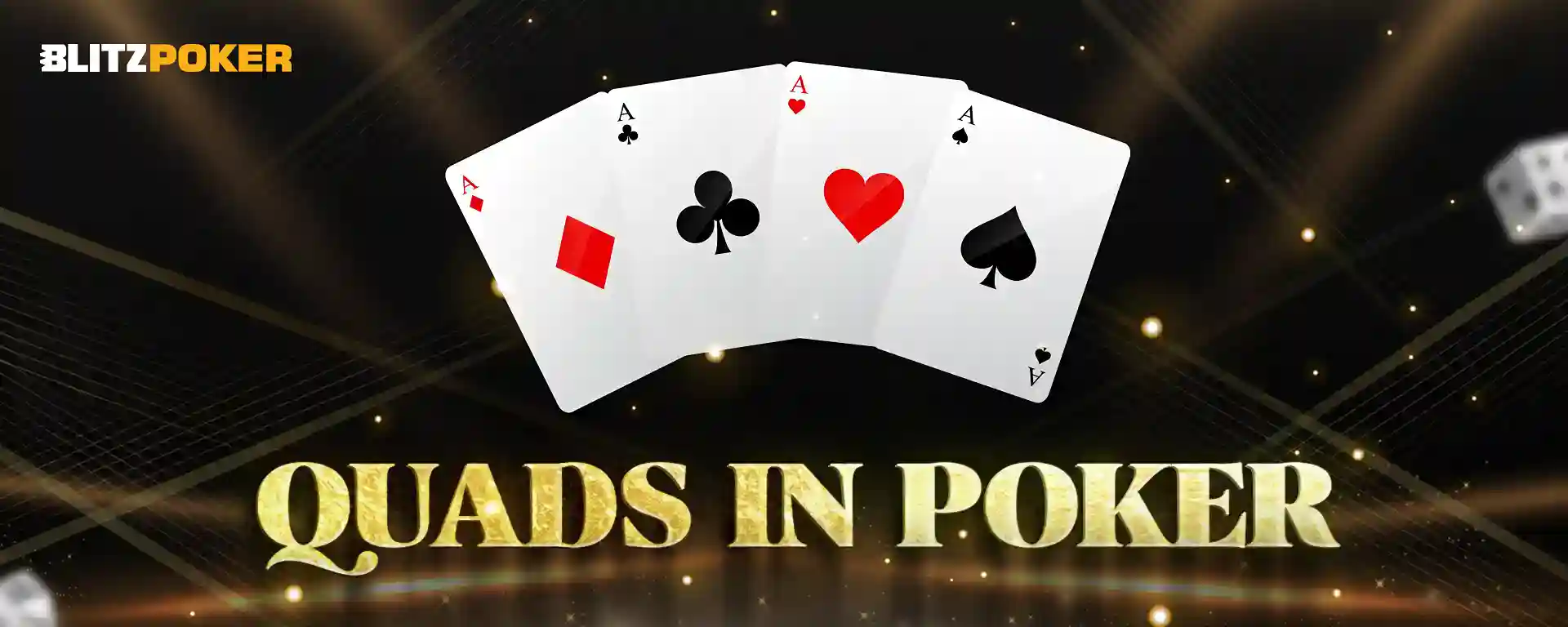What are Quads in Poker
If you’ve ever played poker, you know the thrill of landing a powerful hand. Among the most exhilarating is the quads. This rare and strong hand, with four cards of the same rank, can change the game completely. The chance of getting four of a kind is quite low, so seeing that fourth matching card is thrilling. Holding quads gives you an almost unbeatable hand, which can quickly change the game’s balance and likely lead to a win for the lucky player. Join the poker excitement at BLITZPOKER and experience the thrill of every hand at India’s most trusted poker platform!
So What Do Quads in Poker Mean?
In poker, Quads or Four-of-a-kind is referred to as a hand consisting of four cards of the same rank. For example, having four 8s in your hand qualifies as quads. This hand is second only to a straight flush and a royal flush, making it one of the strongest hands in the game.
The Importance of Quads
Quads are rare, but their rarity is what makes them so valuable. The probability of getting quads in a five-card draw is about 0.024%, which translates to once in every 4,165 hands. In Texas Hold’em, the odds increase slightly, but it’s still a rare and formidable hand. When you land quads, you have an almost certain chance of winning the pot unless someone else holds a straight flush or better.
Pre-Flop Strategy
Before the flop, your focus is on playing solid starting hands. Pocket pairs are the seeds of quads. If you have a strong pair, play it aggressively to build the pot early on. Small and medium pairs can be more tricky, but they have the potential to evolve into quads, so consider playing them, especially in position or if the cost to see the flop is minimal.
Post-Flop Strategy
When the flop reveals the possibility of quads, the game changes significantly. If you’re fortunate enough to have quads, your objective should be to maximise your winnings. Here’s how:
1. Disguise Your Hand: Don’t immediately raise or bet large if you have quads. Slow-playing can lure opponents into betting more, thinking they have a stronger hand.
2. Assess the Board: Consider the texture of the board. If it’s coordinated (e.g., potential for straights or flushes), play more cautiously. If the board is dry, you can afford to slow-play more often.
3. Pot Control: If you believe your opponent has a strong hand, control the pot size to extract maximum value. Gradually increasing bets can lead to a substantial pot by the river.
Post-Turn and River Strategy
By the turn, if you still hold quads, it’s time to maximise your earnings. Consider the following strategies:
1. Baiting Opponents: Continue to slow-play if the board texture permits. Let opponents build the pot by betting into you.
2. Value Betting: On the river, consider making a value bet if you think your opponent will call. The size of the bet depends on the read you have on your opponent and the potential hands they might hold.
Reading Your Opponents
The game of poker is not just about the cards that you hold; it’s also about reading your opponents and reading them right. When you have quads, understanding your opponents’ tendencies can help you extract maximum value. Watch for betting patterns, facial expressions, and any tells that might indicate the strength of their hand.
Advanced Strategies for Quads
Check-Raise
A powerful move with quads is the check-raise. By checking, you give your opponent a chance to bet, which you can then raise, potentially doubling the pot size. This move is particularly effective against aggressive players who are likely to bet when checked to.
Overbetting
In certain situations, overbetting can be an effective strategy. This involves betting more than the size of the pot, putting pressure on opponents. If you have quads and a strong read that your opponent has a decent hand, overbetting might convince them you’re bluffing, leading to a call or even a raise.
Inducing a Bluff
Sometimes the best way to get value from quads is to induce a bluff. By playing passively, you might encourage your opponent to try to steal the pot. When they do, you can pounce with a raise, maximising your winnings.
Quads in Different Poker Variants
Texas Hold’em
In Texas Hold’em, quads are relatively rare but can lead to huge pots. The community card aspect means more players can be involved, increasing the potential for larger bets and bluffs.
Omaha
Omaha’s four-hole cards increase the probability of quads. This variant sees more players hitting powerful hands, making quads a bit more common but still highly valuable.
Seven Card Stud
In Seven Card Stud, players receive seven cards, with only the best five making up their hand. Quads can be hidden for longer, leading to surprising reveals and dramatic pots.
Common Mistakes When Playing Quads
Even with such a powerful hand, players can make mistakes. Here are some to avoid:
1. Overplaying Too Early: Betting aggressively right away can scare off opponents. Slow playing is often more effective.
2. Ignoring the Board: Even with quads, a coordinated board can still be dangerous. Be mindful of potential straights and flushes.
3. Failing to Read Opponents: Pay attention to your opponents’ actions. If they seem disinterested, it might be best to bet more aggressively. If they appear cautious, consider smaller bets to lure them in.
Maximising Value with Quads
Extracting Maximum Value
The key to making the most out of quads is extracting value. Here are some tips:
1. Varying Your Play: Mix up your strategy to keep opponents guessing. Sometimes slow-play, other times bet aggressively.
2. Understanding Pot Odds: Be aware of the pot odds and implied odds. This knowledge can help you decide the best times to bet or raise.
3. Bet Sizing: Adjust your bet sizes based on the situation. Smaller bets can lure opponents, while larger bets can maximise value against strong hands.
